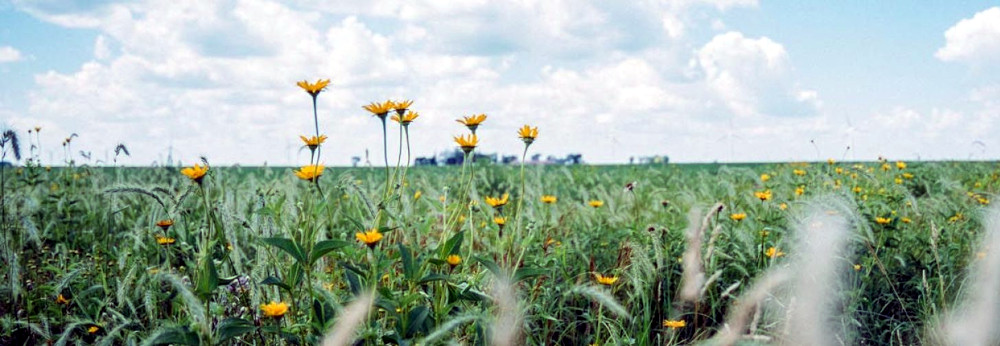European food-innovation coalition launches €30M portfolio to scale regenerative ag
 Image credit: EIT Food
Image credit: EIT Food
A coalition of European food-innovation organizations has launched a
Regenerative Innovation Portfolio, which aims to foster regenerative
agriculture's
potential in Europe by proving concepts and scaling existing initiatives through
new partnerships across agrifood value chains.
EIT Food – a division of the European Institute of
Innovation and Technology (EIT), and the world’s
largest food innovation community – will deploy €15 million to support the
Portfolio, to be matched against funding from its network of corporate
partners.
The Regenerative Innovation Portfolio, established as a Food Innovation Hub
Europe initiative, has been developed through a
collaboration between EIT Food and Foodvalley — the
Netherlands’ primary agrifood think tank. The Portfolio takes a
landscape-level approach, going beyond individual farms to consider
collaborative approaches that span multiple sectors, working at a larger scale.
“It is crucial that we establish a future-fit food system for all; a transition
that can only be achieved by prioritising systemic, regenerative approaches to
agriculture — in a way that keeps farmers front and center and fosters
collaboration between all stakeholders in the food chain,” says EIT Food CEO
Richard Zaltzman. “By matching funding
from partners that invest in landscape-level collaborations in the Regenerative
Innovation Portfolio, EIT Food aims to enable a significant commitment to the
regenerative transition within Europe.”
To date, the Regenerative Innovation Portfolio has already identified five
potential priority landscapes throughout Europe where multiple stakeholders –
including regional governments, investors and retailers – have mutual interests
and complementary sourcing needs. Within these landscapes, the Portfolio aims to
foster greater collaboration across sectors and value chains to help farmers
make the transition to regenerative agriculture.
EIT Food will match corporate-partner contributions of €5 million per year for
three years, building up to a potential total investment of €30 million.
Additionally, some activities in the Portfolio may be designed to generate a
return, which will be re-invested in the Portfolio. All funding will be used to
launch and support Portfolio landscape initiatives, ecosystem development and
inter-landscape learning in a community, as well as actively support initiative
participants with applications for external funding, including government
subsidies, public and private grants, and VC and angel investments.
“We have already seen significant efforts and initiatives from farmers and
cooperatives in the shift to regenerative agriculture. The Regenerative
Innovation Portfolio will be crucial in helping to practically scale and expand
these approaches,” says Foodvalley CEO Marjolein
Brasz. “By creating a
collaborative community, the Regenerative Innovation Portfolio will generate and
share learnings and experiences between landscapes which will help to foster
more successful partnerships and innovation in the future and get all
stakeholders in the landscape transition to play their role.”
Companies that are involved in the Portfolio stand to derive several benefits
from the Portfolio's collaborative, landscape-based approach. In practice,
farmers do not supply to a single stakeholder but supply a range of commodities
to numerous stakeholders — making close collaboration between customers
essential to allow for production of a broad range of regenerative crops and
products at scale. To this aim, the Portfolio brings stakeholders throughout the
supply chain together and fosters new types of innovative, cross-value-chain
sourcing models. Furthermore, by sharing costs, knowledge and experiences, the
Portfolio will allow companies to benefit from complementary capabilities and
resources.
Investors launch $50M fund to scale regenerative-organic ag in US
 Image credit: Mad Capital
Image credit: Mad Capital
Not to be outdone, US-based Mad Capital today
launched the Perennial Fund
II
(PFII) to provide US farmers with tailored loans that help them transition
to regenerative-organic farmland while also increasing farmer profits. PFII,
which is targeting $50 million, has received early commitments from 17
investors — including Builders Vision, Lacebark Investments, Matthew
Zell Family Foundation, The Rockefeller Foundation, the Schmidt Family
Foundation, Zarpet Family Foundation and Zellis Family Foundation.
Building on the success of Mad Capital’s portfolio of funds supporting
regenerative-organic
agriculture,
the PFII aims to bring Mad Capital’s total financing to over 150,000 acres of
farmland and partnerships with more than 50 farming families.
“We are aiming to build a bridge between two distant worlds that need one
another to transition our food system — Wall Street and organic farmers,” said
Brandon Welch, co-founder and
CEO at Mad Capital. “Providing farmers with access to capital gives humanity a
shot at producing an abundance of healthy food while being ecologically
accountable to our working lands and those that steward them.”
Regenerative-organic farmers reverse this damage done by conventional,
extractive agriculture practices by working with nature, not against it —
creating economically and ecologically resilient food systems. PFII — Mad
Capital’s second private credit fund — will provide regenerative-organic farmers
in the US with tailored loans to cover the full array of capital needs so they
can transition to organic,
invest in soil health, develop new markets, and diversify their enterprise.
"Mad Capital is playing an integral role in the transition to regenerative
organic agriculture. Through their innovative and holistic approach, they are
providing capital to farmers who have been overlooked and underserved by
traditional capital markets, while their broader platform also offers technical
assistance, market access, and a sense of community," said Sara
Balawajder, Director of
Investments at Builder’s Vision. "We're excited about Perennial Fund II and its
potential to de-risk this space and open up capital market access more widely to
farmers looking to transition their practices."
PFII will utilize an innovative blended structure with a first-loss pool to
bolster the underlying performance of this quickly emerging sub-asset class
within ag lending. It’s designed to generate impact forward and uncorrelated
current yield within the core fixed-income allocation of a portfolio. Early
indications from Mad Capital’s Perennial Fund I portfolio show that this
risk is further reduced within the niche of regenerative-organic farmers due to
the substantial increase in on-farm revenue from organic premiums.
Only 1 percent of farmland in the United States is certified organic, compared
to almost 10 percent in the EU. Lack of access to capital is a primary barrier
to wider adoption, as traditional financing institutions lack the understanding
and financial products to support regenerative-organic farmers. Transition
finance such as Mad Capital’s is one of the keys to keeping pace with the surge
in consumer demand for regenerative organic food and fiber.
“This is a bold reimagination of financing in nature’s image, empowering farmers
to create farm ecosystems that are good for the Earth and good for humanity,”
said Mad Capital co-founder Phil
Taylor.
Launched in 2019, Mad Capital has been actively lending to regenerative organic
farmers for five years. As of February 2024, Mad Capital has deployed over $25
million to 30 farmers, which has helped transition over 10,500 acres of land to
organic and grow their total portfolio acres by 26 percent per year, up to
79,115 acres. The PFII brings Mad Capital closer to its ultimate goal of
financing 5,000,000 acres of regenerative organic farmland by the end of 2032.
Unilever testing ‘eDNA’ to determine regenerative-farming best practices across its supply chain
 Image credit: Unilever
Image credit: Unilever
Meanwhile, CPG giant Unilever has partnered with
UK-based nature intelligence company
NatureMetrics to support the delivery and
measurement of its new regenerative-agriculture projects — which aim to improve
soil health, water quality and overall biodiversity across Unilever's global
supply chain; as well as enhance crop yield and enable local communities to
protect their livelihoods and environment. Unilever uses around 4 million
hectares of land around the world to grow ingredients for its products.
NatureMetrics — which supports companies in leveraging biodiversity data for
understanding, reporting and managing their impacts on nature — will deploy its
world-leading environmental DNA (eDNA) sampling
technology
in four critical locations across Unilever’s supply chain. Changes in bacterial
and fungal diversity in the soil will be measured, as well as the diversity of
above-ground invertebrate species. The data produced, combined with other
biodiversity metrics, will provide clear insights to demonstrate the positive
impact of regenerative-farming practices implemented in Unilever’s supply chain.
Tom Ludwig, Head of Onshore
Industries at NatureMetrics, said: “The beauty of the data we capture using our
technology is that it’s a common language multiple stakeholders across a supply
chain can use. It will not only support Unilever’s regenerative-agriculture
program at a high level but also empower its suppliers, implementation partners
and farmers with critical information at farm level. Only by bringing every
stakeholder along on the journey can meaningful impact be delivered, and we’re
proud to be at the heart of that with this partnership.”
Critical biodiversity data at the farm level
Unilever launched its Regenerative Agriculture
Principles
in 2021 and its regenerative-agriculture program with suppliers in 2022, to stop
and reverse overall decline in soil health and biodiversity and make farming
truly climate resilient.
Since then, Unilever has set up several projects designed to implement
regenerative-agriculture practices and protect and conserve natural ecosystems,
addressing the challenges and unique needs of different crops and landscapes,
and engaging and supporting the farmers and smallholders that are vital to the
maintenance of these environments to deliver meaningful impact at a farm level.
Its work with NatureMetrics is one of several partnerships to help projects
measure specialist metrics and determine their impact.
NatureMetrics has already begun to establish baseline data across thousands of
hectares in the target areas of Argentina, Canada, Europe, and the UK —
where Unilever recently launched regenerative-farming projects for both mint
and
mustard.
The company will support Unilever and its implementation partners across a
five-year period to collect the best possible data, interpret the data, and
determine which practices should be scaled to deliver the most impact longer
term.
Get the latest insights, trends, and innovations to help position yourself at the forefront of sustainable business leadership—delivered straight to your inbox.
Sustainable Brands Staff
Published Mar 20, 2024 8am EDT / 5am PDT / 12pm GMT / 1pm CET